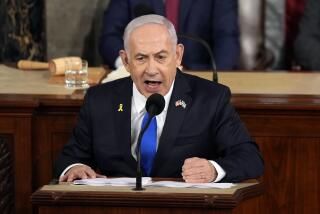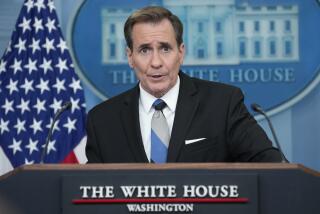Clinton Policy Backs U.S. Arms Sales Abroad : Military: Health of American industries is made an explicit objective. President’s stance on weapons trade disappoints those seeking restraint.
- Share via
WASHINGTON — Brushing aside calls for a U.S.-led effort to dampen the international weapons trade, President Clinton approved a post-Cold War policy Friday that reaffirms Washington’s traditional position that arms sales are a legitimate instrument of foreign policy.
The new policy, which culminates an 18-month, high-level review, is expected to maintain American arms sales abroad near the current level of $12 billion annually, although the worldwide market for conventional weapons is shrinking in response to easing East-West tensions.
According to the White House, the United States will support arms “transfers that meet legitimate defense requirements of our friends and allies, in support of our national security and foreign policy interests.”
For the first time, the policy sets the economic health of the American arms industry as an explicit objective of overseas weapons sales. That has always been a factor, though it was never before spelled out.
But Eric Newsom, deputy head of the State Department’s political-military affairs bureau, insisted that commercial considerations will play a subordinate role.
“Our decisions will be made fundamentally on national security grounds,” he said. “Once a decision has been made on national security grounds to approve a particular transfer, then it is important that U.S. defense firms receive the support of the United States government in seeking to make that sale.”
Clinton’s decision drew immediate criticism from arms control groups, which had pressed for a new policy of restraint to replace the ideology-driven arms competition between Washington and Moscow during the Cold War.
“Clinton just doesn’t seem to mind continuing the United States’ role as the No. 1 merchant of death,” said Scott Nathanson, disarmament campaign organizer for the Peace Action Education Fund. “He should have left this directive to gather dust somewhere in the back recesses of the White House.”
White House Press Secretary Mike McCurry said the United States will try to negotiate with other arms-selling nations new restrictions on the transfer of military technology to areas of potential conflict.
In any event, he said, the United States will “exercise unilateral restraint” in cases where “overriding national security or foreign policy interests require us to do so.”
Nevertheless, the United States is the clear world leader in conventional arms sales, accounting for almost half of the market.
In previous decades, the United States and the Soviet Union were both major arms suppliers, but Russia has lost most of the Soviet market share.
More to Read
Sign up for Essential California
The most important California stories and recommendations in your inbox every morning.
You may occasionally receive promotional content from the Los Angeles Times.













